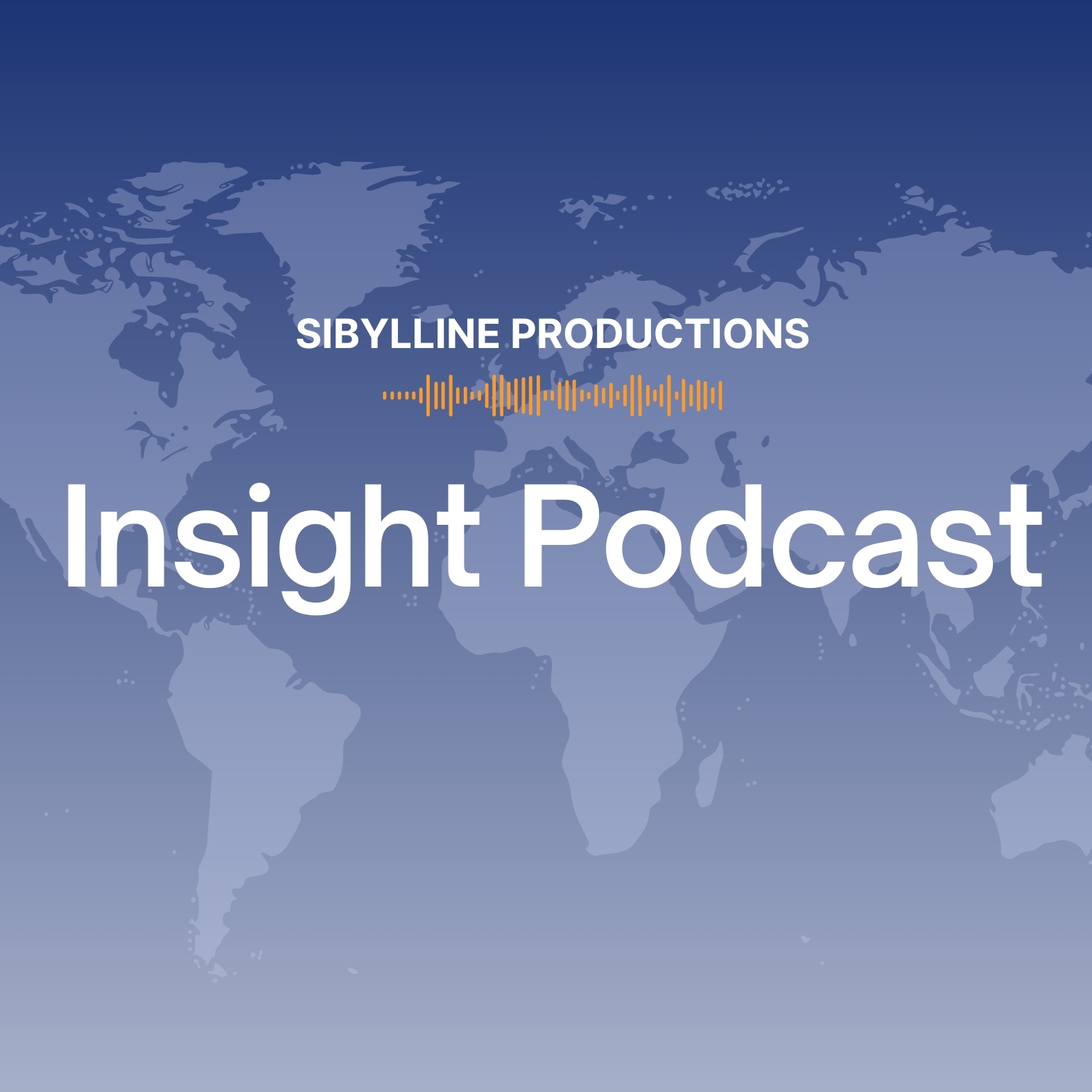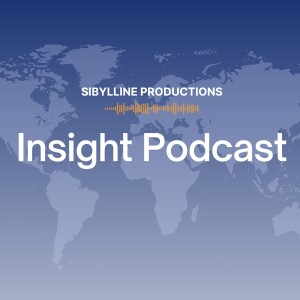
26.7K
Downloads
169
Episodes
Welcome to Sibylline Insight, the podcast where we delve into the intricate world of global intelligence and geopolitics. Join our hosts as they sit down with members of the Global Intelligence Team to provide in-depth analysis and context to the most pressing geopolitical developments of our time. Each episode features long-form interviews that unravel the complexities behind current events, offering listeners a unique perspective on international affairs. Whether you’re a seasoned analyst or simply curious about the forces shaping our world, Refined Insight promises to inform, enlighten, and engage. Tune in for thought-provoking conversations, expert opinions, and comprehensive insights that go beyond the headlines. Welcome to a deeper understanding of global dynamics with Sibylline Insight.
Episodes

Thursday Apr 28, 2022
China-Solomon Islands Security Cooperation Agreement
Thursday Apr 28, 2022
Thursday Apr 28, 2022
After much media speculation and diplomatic concerns, Beijing and Honiara finally confirmed the signing of a "Security Cooperation Agreement" last week. Although neither government has disclosed the content of the agreement, a draft leaked in March revealed the extent of proposed close cooperation on security and defence affairs, including the possibility of deploying Chinese police and armed forces, as well as military assets to the Pacific island nation. The move has raised concerns amongst other key stakeholders in the region, with Australia, New Zealand, the US, and Japan all voicing strong opposition to the pact. Foreign diplomatic attempts to dissuade Honiara from signing the agreement were to no avail.
This week, join our Lead Asia-Pacific Analyst, Dr Guo Yu, and fellow APAC analysts Riccardo Cociani and Aédán Mordecai, as we discuss the details of this agreement and its geopolitical implications for the region and beyond.

Friday Apr 22, 2022
Friday Apr 22, 2022
In this week's podcast, join our Lead Middle East & Africa Analyst Eloise Scott, along with Benedict Manzin our Sub Sahara Africa Analyst, and Edie Lipton our Associate Analyst, as we discuss the presidential election in Somalia.
With the majority of Somalia’s parliament now in place, pressure is building to finally conclude presidential elections before IMF programmes automatically lapse. However, there is a high likelihood that elections will prompt allegations of fraud. Al-Shabaab seeks to exacerbate this and stands to gain from infighting within the armed forces, threatening an escalation in attacks, including in neighbouring countries.

Thursday Apr 14, 2022
Discussing Pakistan’s New Prime Minister and Government
Thursday Apr 14, 2022
Thursday Apr 14, 2022
Former opposition leader Shehbaz Sharif replaced Imran Khan as the new prime minister of Pakistan after a disrupted no-confidence motion over the weekend. However, Sharif will now face a set of pressing challenges such as protests by Khan and his supporters, and a debilitated economy while also having to form an amicable relationship with the country's powerful military establishment.
Join your host our Lead Asia-Pacific Analyst, Dr Guo Yu, our South Asia Analyst, Supriya Ravishankar and our Asia-Pacific Analyst, Aédán Mordecai, as they disentangle these challenges and assess what looks set to be a rocky road ahead for the new government.

Friday Apr 08, 2022
Discussing the French Presidential Elections
Friday Apr 08, 2022
Friday Apr 08, 2022
In this week's podcast, join your host Liana Semchuk, our Lead Europe and Eurasia Analyst, along with Louis Cox-Brusseau, our Europe Analyst, and Zsofia Wolford, our Associate Europe Analyst to discuss the up and coming French Presidential Elections.
The first round of France's 2022 presidential elections will be held on 10 April. Incumbent President Emmanuel Macron is currently most likely to win a second five-year term, but with an increasingly stagnant election campaign, he faces a substantial challenge from far-right candidate Marine Le Pen, who has emerged as a clear challenger ahead of the first round. Extreme right-wing ideologue Éric Zemmour, conservative leader Valérie Pécresse and socialist Jean-Luc Mélenchon all face a difficult battle to survive to the second round, but voter apathy may increase this election's unpredictability as a historic low turnout is expected.

Friday Apr 01, 2022
Friday Apr 01, 2022
In this week's podcast, join your host Valeria Scuto, our Middle East, North Africa and Turkey Analyst, along with Rhiannon Phillips and Anastasia Chisholm, our Associate Analysts, discuss the multiple religious festivities in the Middle East and North Africa regions taking place over the coming month, amid a significant uptick in violent attacks and conflict escalations.
Notably, Israel has witnessed one of the deadliest weeks in years, both in terms of ethno-religious and terrorist violence, heightening concerns over a return to protracted levels of inter-communal violence ahead of the holy month of Ramadan and the Jewish Passover.
Equally, regional leaders express anxieties over the true longevity of the current ceasefire between the Houthis and Saudi-led Coalition, and whether any further escalation in the trajectory of the conflict will sustain the risk of cross-border attacks. Finally, the global economic fallout of the Russia – Ukraine conflict will likely place additional pressures on deepening food insecurities in the region, particularly in countries such as Egypt, Tunisia and Lebanon. As such, rising food prices and soaring inflation rates represent the primary drivers of civil unrest in the coming weeks.

Friday Mar 25, 2022
Friday Mar 25, 2022
In this week's podcast, join your host Eloise Scott, our Global Intelligence Manager, along with Benedict Manzin, our Sub Sahara Africa Analyst to discuss the increase in food and fuel prices due to Russia’s invasion of Ukraine and how it will drive widespread inflation and increase strains on rising numbers of people facing severe food insecurity, with associated unrest likely to exacerbate political crises, particularly across the Horn of Africa. The conflict will also renew competition between western states and Russia for influence in Africa, empowering authoritarian governments.

Friday Mar 18, 2022
Friday Mar 18, 2022
In this week's podcast, join your host Eloise Scott, our Global Intelligence Manager, along with Rhiannon Phillips, our Associate Analyst to discuss the missile strikes launched by Iran on 13 March on targets in the northern Kurdistan region of Iraq, with somewhat conflicting accounts of target-type and motive. Iranian claims that the attack targeted Israeli "strategic centres" moderately elevate the risk of a return to tit-for-tat hostilities between Iran and Israel, as well as other recent diplomatic developments between Iran and the UK and US that could help to unblock stalled nuclear talks.

Thursday Mar 03, 2022
Discussing the South Korean Presidential Election
Thursday Mar 03, 2022
Thursday Mar 03, 2022
Voters in South Korea will head to the polls next Wednesday to elect their new head of state, as the constitution limits the incumbent President Moon Jae-in to a single five-year term. Despite the election being overshadowed by the escalating conflict in Ukraine and the associated fallout, this presidential race looks set to be one of the closest contests. The two front-runners, Lee Jae-myung and Yoon Suk-yeol, appear to be neck-and-neck in opinion polls, though both have been embroiled in corruption scandals.
Join our Lead Asia-Pacific Analyst, Dr Guo Yu and fellow APAC Analyst and Korean politics specialist Hans Horan, as we discuss the upcoming vote and its significance in shaping South Korea's socio-economic policy as well as the security situation in the Korean Peninsula for the next five years.

Friday Feb 11, 2022
Assessing the Drivers of Coups in West Africa
Friday Feb 11, 2022
Friday Feb 11, 2022
Over the past year, the Economic Community of West African States (ECOWAS) has undergone three successful coups among its member states, prompting fears of a potential shift back to the political instability that marked many post-independence African governments. While driven by a variety of factors, the coups in Burkina Faso, Guinea and Mali appeared to share key similarities. Namely, these were instances where younger officers successfully identified that elevated levels of anti-government sentiment would provide them cover to act against their governments and secure advancement. The podcast will examine this phenomenon and highlight the ways in which the military juntas that have developed from these coups now act as a source of inspiration and support for other military governments and outline the challenge this trend creates for the region.
In this week's podcast, join our Lead Middle East & Africa Analyst Eloise Scott, along with Benedict Manzin our Lead Sub Sahara Africa Analyst, and Edie Lipton our Associate Analyst, as we discuss the drivers behind Coups in West Africa.

Friday Feb 04, 2022
Beijing 2022: Politics, Covid and Public Perception
Friday Feb 04, 2022
Friday Feb 04, 2022
As China kicks off the Beijing 2022 Olympic Winter Games with what is promised to be a "very different" opening ceremony from the one 14 years ago, the context under which the Winter Games are held also could not be more contrasting to that of the 2008 Summer Olympics. Not only will the event be subject to the most comprehensive Covid-19 countermeasures ever seen in international sports but the Games have also been shrouded by much controversy regarding China's human rights record – all taking place against the backdrop of intensifying geopolitical jostling between Beijing and Washington.
In this week's podcast, join our Lead Asia-Pacific Analyst Dr Guo Yu, and fellow APAC Analysts, Aédán Mordecai and Hans Horan, as we discuss the broad geopolitical and security risks connected to the Beijing Winter Olympic Games.
